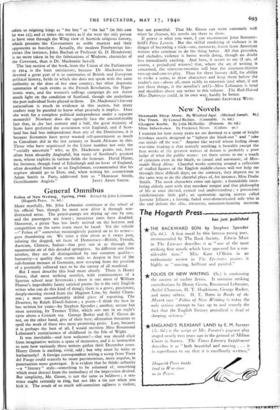General Omnibus
Folios of New Writing, Spring, 1940. Edited by John Lehmann. (Hogarth Press. 75. 6d.) MOST manfully, Mr. John Lehmann continues at the wheel of his official 'bus, though he must now drive it through war- distracted areas. The petrol-pumps are drying up one by one, and the passengers are fewer ; insurance rates have doubled. Moreover, a pirate 'bus has lately arrived on the horizon and competition on the same route must be faced. Yet the vehicle —" Folios of" somewhat meaninglessly painted on to its mine— goes thundering on. We raise a thin cheer as it sways past, saluting the dogged, set faces of Democracy—British, French, Austrian, Chinese, Indian—that peer out at us through the aquamarine air of this dreaded springtime. So different one from another, they are all distinguished by one common quality- humanity—a quality that seems only to deepen in face of the sub-human menace of Germany, now stooping from the position of a poetically cultured race to be the enemy of all mankind.
But I must describe this load more closely. There is Henry Green, that most striking novelist, with reminiscences of a Spartan school near Sevenoaks ; there is one more of William Plomer's improbably funny satirical poems (he is the only English writer who can do this kind of thing); there is a grave, passionate, deeply-moving record from the Maginot Line, by Andre Cham- son ; a most uncomfortably skilful piece of reporting, The Deserter, by Ralph Elwell-Sutton ; a poem—I think the best he has written for years—by Stephen Spender ; another, arcane but most arresting, by Terence Tiller, which sets one in an eagle's eyrie above a Cornish sea. George Barker and G. F. Green do not, on the other hand, give of their best; affectation threatens to spoil the work of these two most promising poets. Last, because it is perhaps the best of all, I would mention Miss Rosamond Lehmann's reminiscence of childhood in the Isle of Wight.
It was inevitable—and how welcome!—that war should elicit from imaginative writers a spate of memories, and it is instructive to note how variously these writers gather their December roses. Henry Green is exciting, vivid, odd ; but why must he write so barbarously? A foreign correspondent wiring a scoop from Terra del Fuego could scarcely be more parsimonious, more angular, in punctuation more grotesque. It is evident that he thinks urbanity —a " literary " style—something to be ashamed of, something which must detract from the immediacy of the impression desired. But simplicity, Mr. Green, is not the same as baldness ; a sen- tence ought certainly to ring, but not like a tin can when you kick it. The result of so much self-conscious ugliness is violent, but not powerful. That Mr. Green can write extremely well when he chooses, his novels are there to show.
If power is what you want, I can recommend John Sommer- field's First Lesson. But the skilful rendering of violence is in danger of becoming a trick—one, moreover, learnt from American writers who continue to do the thing better. All that precedes, and excludes, violence is better worth doing, though no doubt less immediately exciting. And here, it seems to me (I am, of course, a prejudiced witness) that, where the art of writing is concerned, the nineteen-twenties still beat the nineteen-thirties two-up-and-one-to-play. Thus for sheer literary skill, for ability to evoke a scene, to draw characters and keep them before the reader's eye—above all, most richly to entertain (and what, if not just these things, is the novelist's art?)—Miss Lehmann is head and shoulders above any writer in this volume. The Red-Haired Miss Daintreys could, in its own way, hardly be better.
EDWARD SACKVILLE WEST.


































 Previous page
Previous page